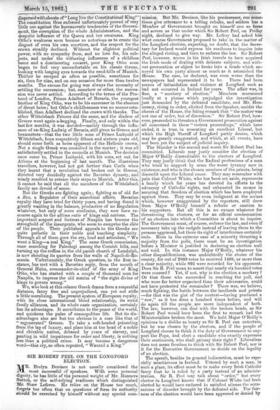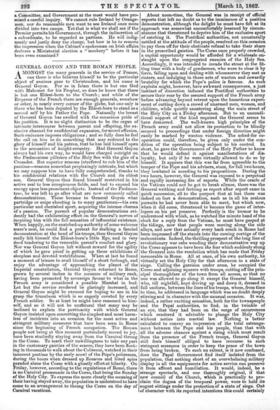SIR ROBERT PEEL ON THE tONGFORD ELECTION.
MR. Evelyn Denison is not usually, considered the most successful of speakers. With some personal dignity, he has little of the .personal weight of Mr. Manners Sutton, or the self-relying readiness which distinguished Mr. Shaw Lefevre. He relies on the House too much, forgets too often that on questions of form its authority should be exercised by himself without any special corn- mission. But Mr. Denison, like his predecessor, can some- times give utterance to a telling rebuke, and seldom has a Member of Government brought on himself one so terse and severe as that under which Sir Robert Peel, on Friday night, declined to give way. Mr. Lefroy had asked him what course Government proposed to take in the matter of the Longford election, expecting, no doubt, that the Secre- tary for Ireland would express his readiness to inquire into the alleged rioting, and then to enforce the law. Sir Robert Peel, however, seems in his Irish travels to have acquired the Irish mode of dealing with delicate subjects, and with- out provocation or object be broke into a tirade which an- noyed his own party almost as much as it astonished the House. The case, be declared, was even worse than the newspapers had represented it to be. There had been scenes of intimidation and violence at Longford such as had not occurred in Ireland for years. The affair was, in fine, a "mockery of election." Members murmured loudly at a phrase which prejudged the investigation just demanded by the defeated candidate, and Mr. Hen- nessey, rising to order, elicited from the Speaker, amidst the cheers of the House, the biting remark that "the matter was not one of order, but of discretion." Sir Robert Peel, how- ever, proceeded to threaten a Government prosecution against all concerned in these "violent proceedings," which have ended, it is true, in unseating an excellent Liberal, but which the High Sheriff of Longford. partly denies, which may be greatly exaggerated, and which, at all events, have not been yet the subject of judicial inquiry. The blunder is the second and worst Sir Robert Peel has committed. Liberals may justly consider the election of Major O'Reilly discreditable to the electors of Longford. They may justly think that the Radical professions of a man who tried to support by arms the worst tyranny now in existence, and who is the chosen nominee of the priests, bring discredit upon the Liberal cause. They may remember with pain that Colonel White, who has been set aside, represents a family which for years has devoted its efforts to the advocacy of Catholic rights, and exhausted its means in securing that freedom of election which has been employed against them. They may be even indignant at the scenes which, however exaggerated by the reporters, still drew from Major O'Reilly himself a rebuke or caution to his supporters. But all this is no excuse whatever for threatening the electors, or for an official condemnation of an election into which a Committee is about to inquire. The Government must, of course, enforce the law, and even if necessary take up the cudgels instead of leaving them to the persons aggrieved, but there its right of interference certainly ends. Even in the extreme case of a minority thrusting a majority from the polls, there must be an investigation before a Miniater is justified in declaring an election null and void. In this instance Major O'Reilly, whatever his other disqualifications, was undoubtedly the choice of the county, for out of 2869 votes he received 1468, or more than a clear majority, while 892 were recorded for his opponent. Does Sir R. Peel mean to assert that nearly six hundred votes were coerced ? Yet, if not, why is the election a mockery ? Or that those who succeeded in reaching the poll, and who were far better organized than their adversaries, could not have protected the remainder ? There was, we believe, much fighting, the battle between the landlords and priests —for that was the gist of the contest—having produced a "row," as it has done a hundred times before, and will do again till the people, are more independent of both. The law, however, can deal with the broken heads, as Sir Robert Peel would have been the first to remark had the Ministerialists broken the most. We hold Major O'Reilly's opinions in a dislike as hearty as Sir R. Peel can entertain, but he was chosen by the electors, and if the people of Longford choose to think it the duty of Government to sup- port the Pope, and elect a candidate who exactly expresses their sentiments, who shall gainsay their right ? Liberalism does not mean freedom to think with Sir Robert Peel, nor is it for the Executive Government to decide on the legality of an election. The speech, besides its general indiscretion, must be espe- cially mischievous in Ireland. Uttered by such a man, in such a place, its effect must be to make every Irish Catholic fancy that he is ruled by a party instead of an adminis- tration. Sir R. Peel may talk about "order," but every elector in Longford knows that if Colonel White had been elected be would have endured in satisfied silence the accu- sations of disorder brought by the defeated side. The fair- ness of the election would have been approved or denied by a Committee, and Government at the most would have pro- mised a careful inquiry. We cannot rule Ireland by Orange- men, nor do reasonable men want to see Ireland once more divided into two camps. Yet that is what we shall see if the Premier permits his Government, through the indiscretion of a subordinate, to be regarded as partisan. He will indig- nantly and justly deny the charge, but how is he to remove the impression when the Cabinet's spokesman on Irish affairs declares a Ministerial election a "mockery" before it has been even examined ?































 Previous page
Previous page